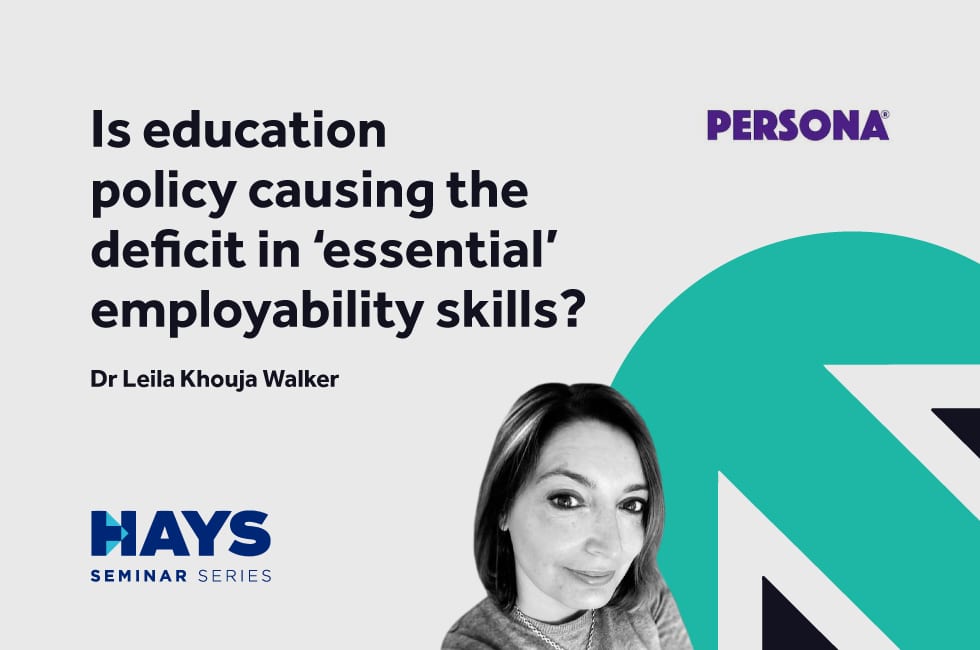We are delighted to be in partnership with Hays Education, hosting a series of free breakfast seminars, bringing together thought leaders and education leaders up and down the country to explore our most pressing education issues; and what the possibilities are with a longer-term vision for our Education system.
In our first event, we invited Paul Drechsler CBE and Dr Leila Khouja Walker, Co-Founder of Persona Education and a Senior Lecturer in Education and Childhood at the University of the West of England, to discuss the future world of work & its implications for education.
We are delighted to be able to share Dr Leila Khouja Walker research and analysis that was shared during this important discussion.
Is education policy causing the deficit in ‘essential’ employability skills?
According to the United Nations – the ultimate purpose of education is “to prepare us for life”. And it would be hard to argue that for many of us, a significant part of life is indeed work.
But how does education best support young people to prepare for their future work lives? And what is needed to become ‘workplace ready’?
Even before the AI summit earlier this month, when Elon Musk made the comment “no job will be needed” about the future workplace, many others have been predicting that humans will need to transfer their skills to those which AI and machines cannot. According to the World Economic Forum these skills include:
- Non-verbal communication
- Deep empathy
- Growth management
- Creativity
So, alongside the technical and digital skills required for the future workforce, there is seemingly, a massive requirement for a range of ‘softer’ skills.
Let’s add a bit of context to this apparent ‘soft skills’ shortage and the challenge for education.
In 2021, the OECD Beyond Academic Learning survey showed that these ‘soft skills’ or ‘social-emotional skills’, as many in the field now refer to them, actually decline in teenage years. It appears that the average 10 year old has up to 30% better social and emotional skills than the average 15 year old – not great when these are the same skills employers say they need! And sadly, but perhaps of no surprise, students from lower social-economic groups measure lowest across every ‘skill’ measured – which means any attempts to widen the workplace talent pipeline must take this into consideration.
So why might education not be meeting this need for ‘soft skills’?
Let’s focus on three areas of education policy and relevant statutory guidance.
1. The National Curriculum for England
The NFER, funded by the Nuffield Foundation, is carrying out research called the Skills Imperative 2035. So far, they have identified the most vital ‘essential employment skills’ for future employment. These include creativity, critical thinking, team work, problem solving and resilience, all ‘soft skills’, as well as, Information Technology. They stated in a recent report:
“Unlike many other countries, the English national curriculum does not define and integrate a set of transferable ‘essential employment skills’”
Now you don’t have to look far to see how other places are indeed incorporating such skills.
The Northern Ireland curriculum requires specific teaching on ‘communication’, ‘working with others’, ‘self-management’ and ‘problem-solving’ as well as, ‘learning for life and work’ as compulsory components to be studied at Key stage 4.
“The goal is not to teach each of these skills in isolation, without a context; rather, they are embedded in all parts of the curriculum.”
The EDGE Foundation with the National Education Union are carrying out similar research into “How schools are developing real employability skills?” and have drawn up a comparable list of must have ‘soft skills’. Interestingly they’ve started to report on which skills are least developed in schools. These are confidence, creativity and resilience alongside digital skills.
Finally, a word from the Careers Colleges Trust.
“The National Curriculum is NOT naturally aligned to career routes or steps to work.”
This is perhaps a symptom of secondary school teachers training as subject specialists with most having limited knowledge about the many new and emerging job roles and the skills shortages.
I’ll come onto the role of teachers and teacher training later on.
2. Ofsted, Education Inspection Framework (EIF)
Ofsted say they want to:
“…see providers developing the knowledge, skills and behaviours that learners need to progress and achieve. How are they adding value to learners’ progression or employment prospects?”
A school is measured across four inspection strands, each with guidance on what the inspectorate is seeking evidence on to make their judgment/grade.
If you comb carefully through the framework – you will occasionally find a nod towards a school being responsible for the development of these ‘soft skills’ and the preparation of learners for their next transitions including employment.
Strand 1 – Quality of Education
– coherently planned curriculum, sequenced towards cumulatively sufficient knowledge and skills for future learning and employment.
– learners are ready for the next stage of education, employment or training.
Strand 3 – Personal development
– the curriculum and the provider’s wider work support learners to develop their character
– including their resilience, confidence and independence.
I am not necessarily advocating for prescriptive measures, however, if the role of education is to prepare students for life – whether that’s next stage education, training or employment – and we know from research and from the employers that school and college leavers are not sufficiently equipped with these soft skills – then I pose the following two questions:
- Should the National Curriculum for England include more overt learning outcomes based upon these employability skills and/or
- Should Ofsted be providing more guidance on how schools may wish to support these employment skills from sharing what they’ve seen in practice?
As an aside, I acknowledge that the DfE produces statutory career guidance – linked to the Gatsby benchmarks and the new Baker clause (Jan 2023), regarding access to good career guidance as well as tech ed quals and apprenticeships. But career guidance is not skills education.
3. Teacher Standards and the Content Curriculum Framework
Research indicates teachers have a significant impact on learning outcomes.
The Teacher Standards is a statutory document that outlines what teachers should know and be able to do – basically the attributes teachers require to deliver good teaching and learning. It is supported by the Content Curriculum Framework (CCF). In essence they are our professional standards. However, if you were to critically review them you would be hard pressed to see anything that hinted at a teacher being able to support students to develop ‘soft skills’.
So where can we see evidence of the need for soft skills in the Teacher Standards?
Four of the standards use recognisable ‘skill’ terminology. They are:
Standard 1 – Set High Expectations – ‘perseverance’, ‘respect’
Standard 3 – Good subject and curriculum knowledge – ‘critical skills’, ‘oral skills’
Standard 4 – Plan and teach well-structured lessons – ‘group work’, ‘class talk’
Standard 7 – Managing behaviour – ‘self-regulation of emotions’, ‘resilience’, ‘effective relationships’ and ‘goal-setting’.
So, you can certainly find some references to ‘soft skills’, but guidance on how you might support these and how they act as key ‘transferable’ or ‘essential’ skills for life – you could argue is missing from the Teacher Standards, as well as, the CCF. Of note, these ‘skills’ are set in the context of learning and the school environment – not the future training or work setting. This last point is highly relevant if we want to prepare students for the future workplace.
Therefore, in addition to my two questions above, I would like to pose a third:
3. Do teachers have a shared understanding of what these ‘skills’ are, and how to apply them to future training or employment contexts?
Once more, this is not me advocating to add any more layers of prescriptive practice or indeed policy BUT a warning that perhaps just sprinkling these words in policy documents whether it is the NC or Ofsted’s EIF or the Teacher Standards is seemingly, not hitting the mark.
So as commentators, such as FED, push for long term policy in education, let us consider the role of this policy in supporting education to ‘prepare us for life’, and the statutory and indeed non-statutory guidance that will support schools to deliver on this universal education mission.
A final but I believe poignant point to end this article with. Research shows that these same ‘soft skills’, improve students’ and teachers’ wellbeing. And considering the mental health and wellbeing crisis we are facing with young people and the teaching workforce – surely this is enough gravitas to try and re-address the balance of these ‘soft skills’ in education?



